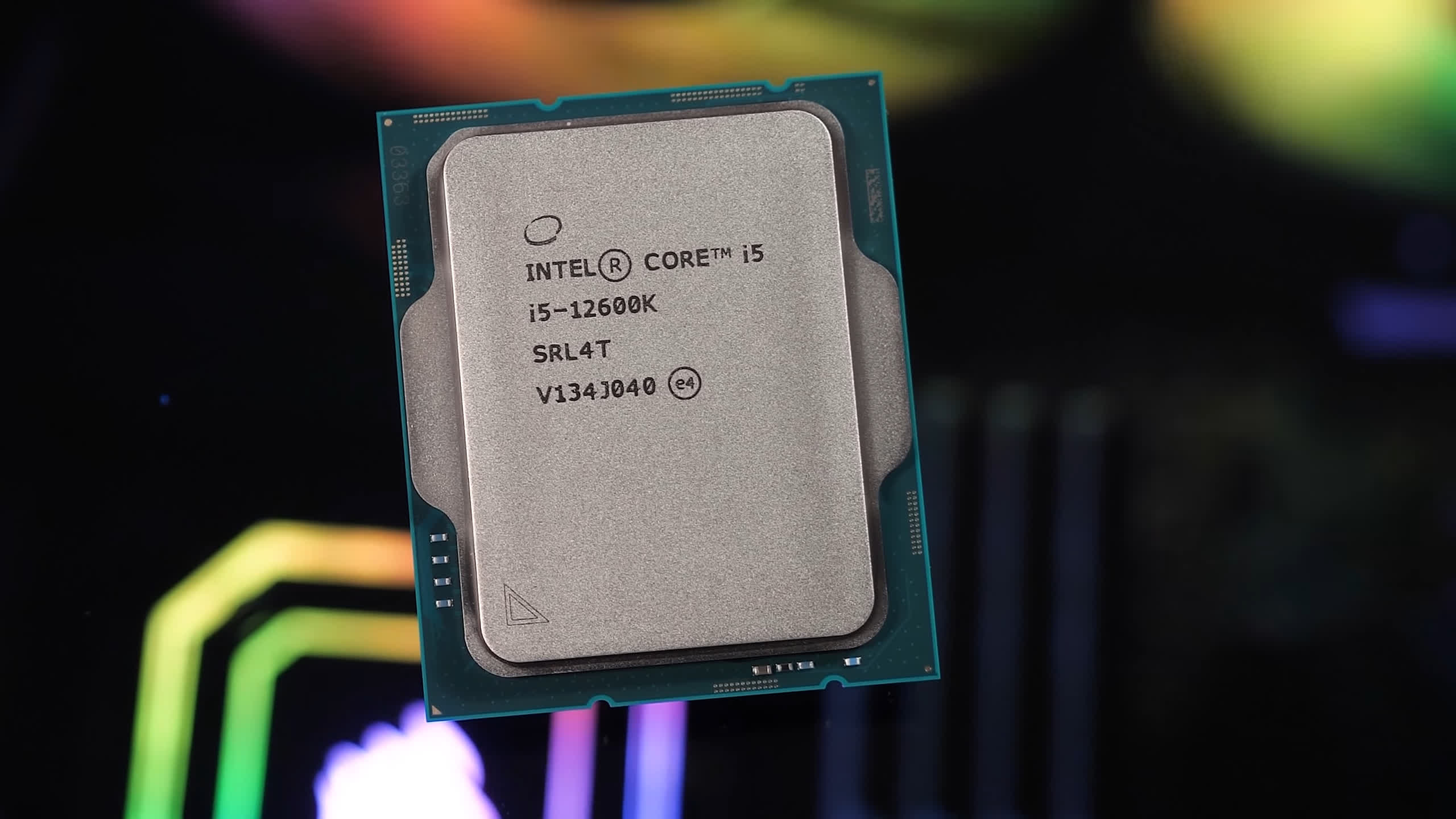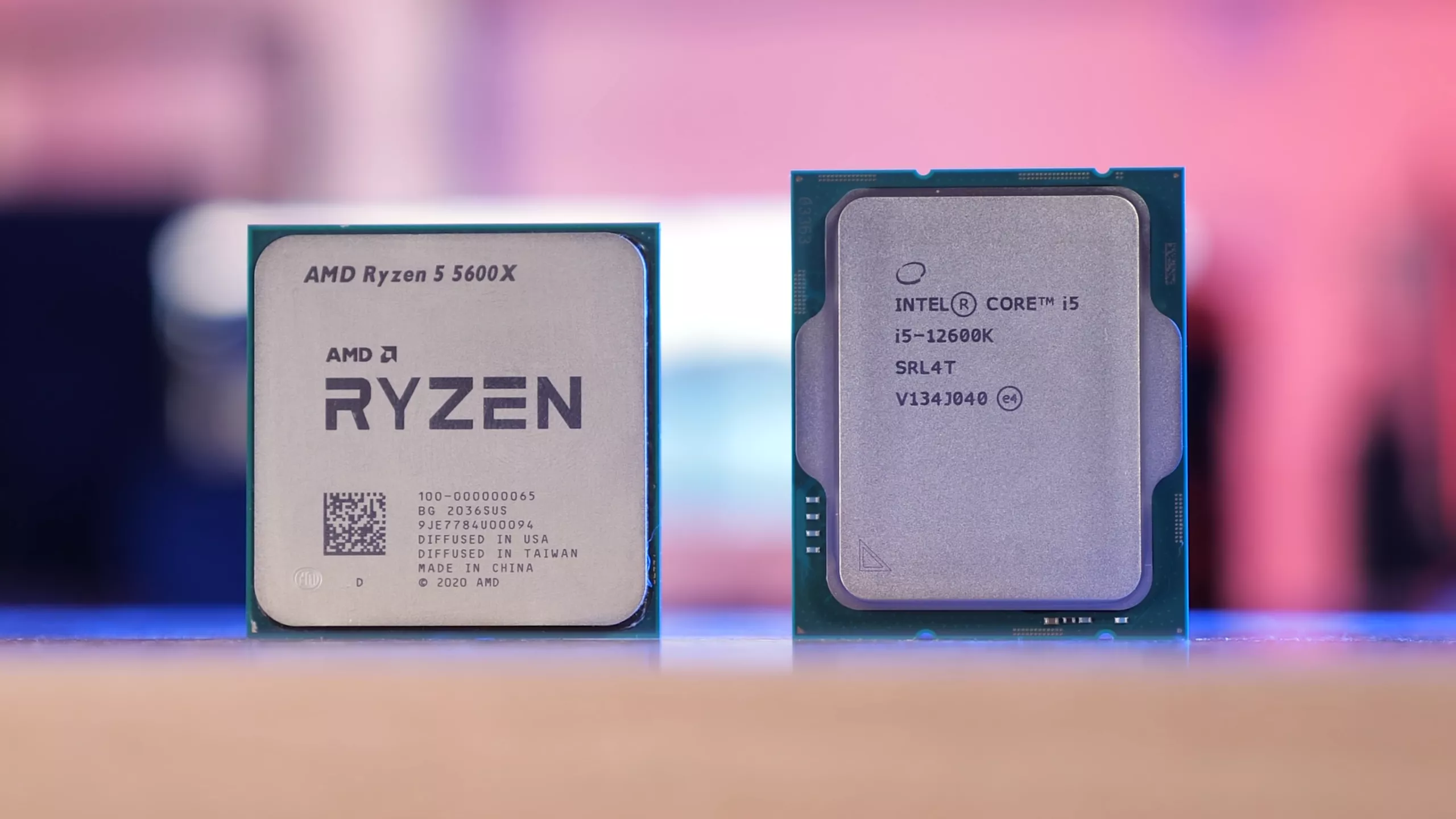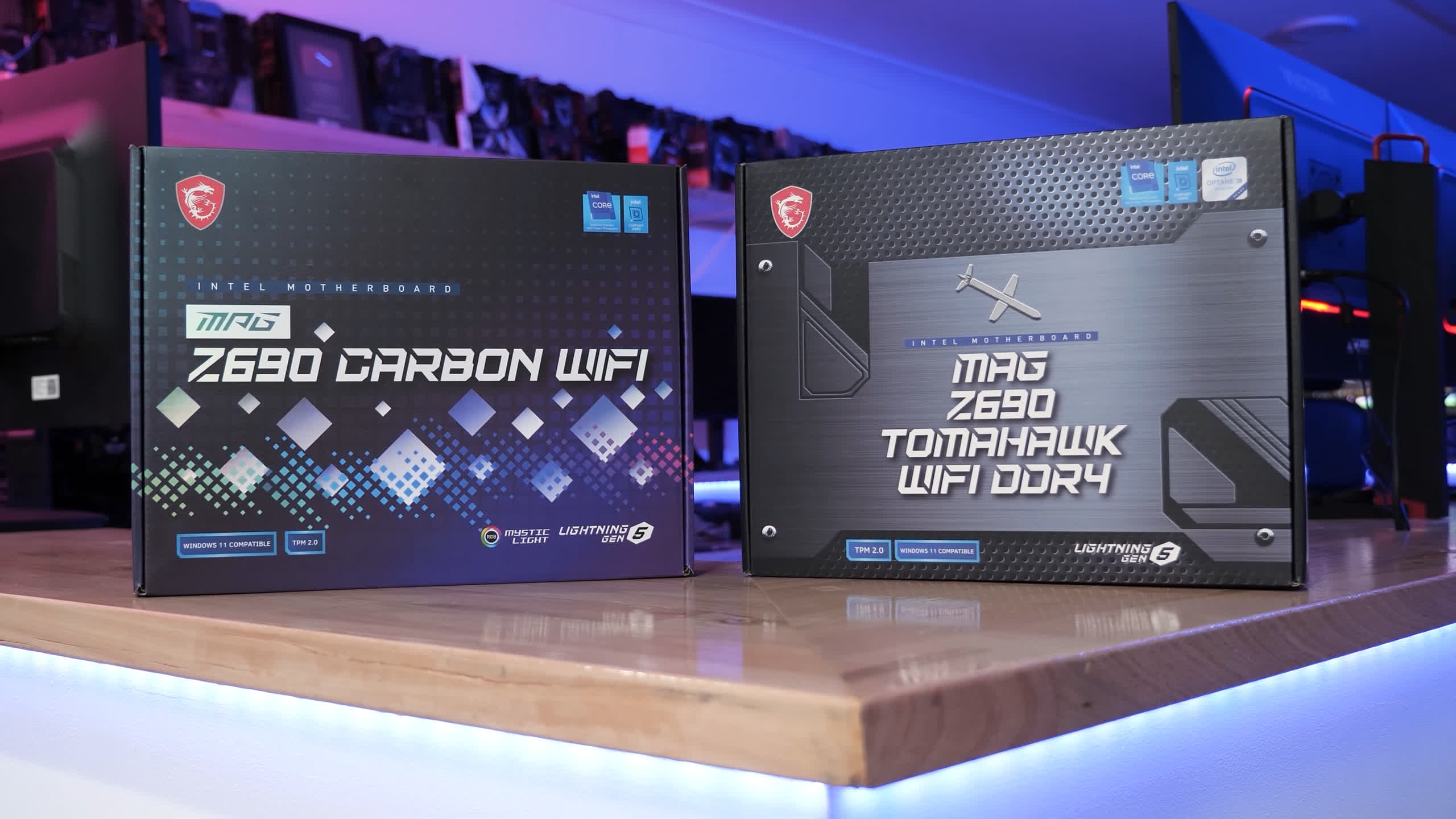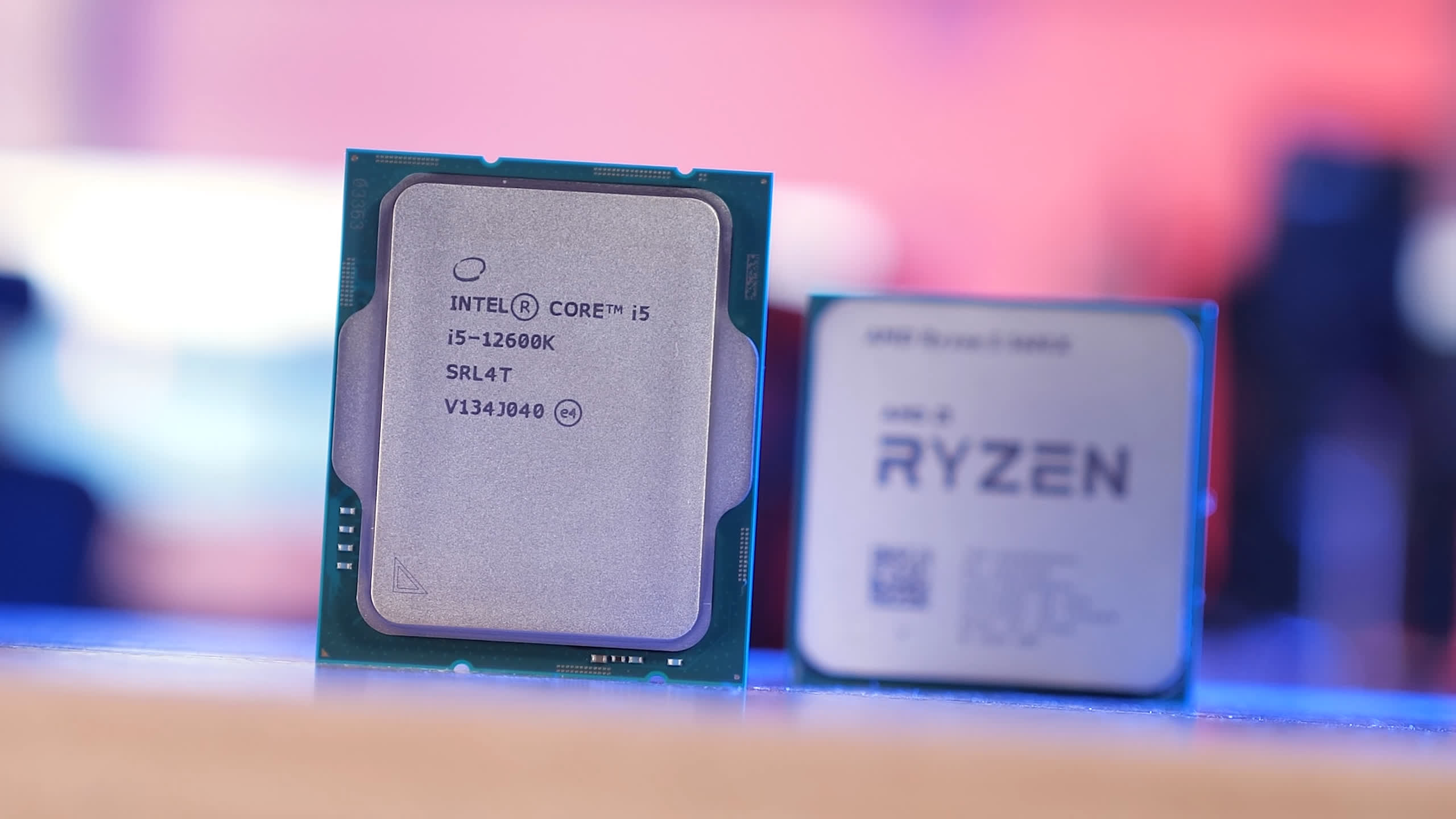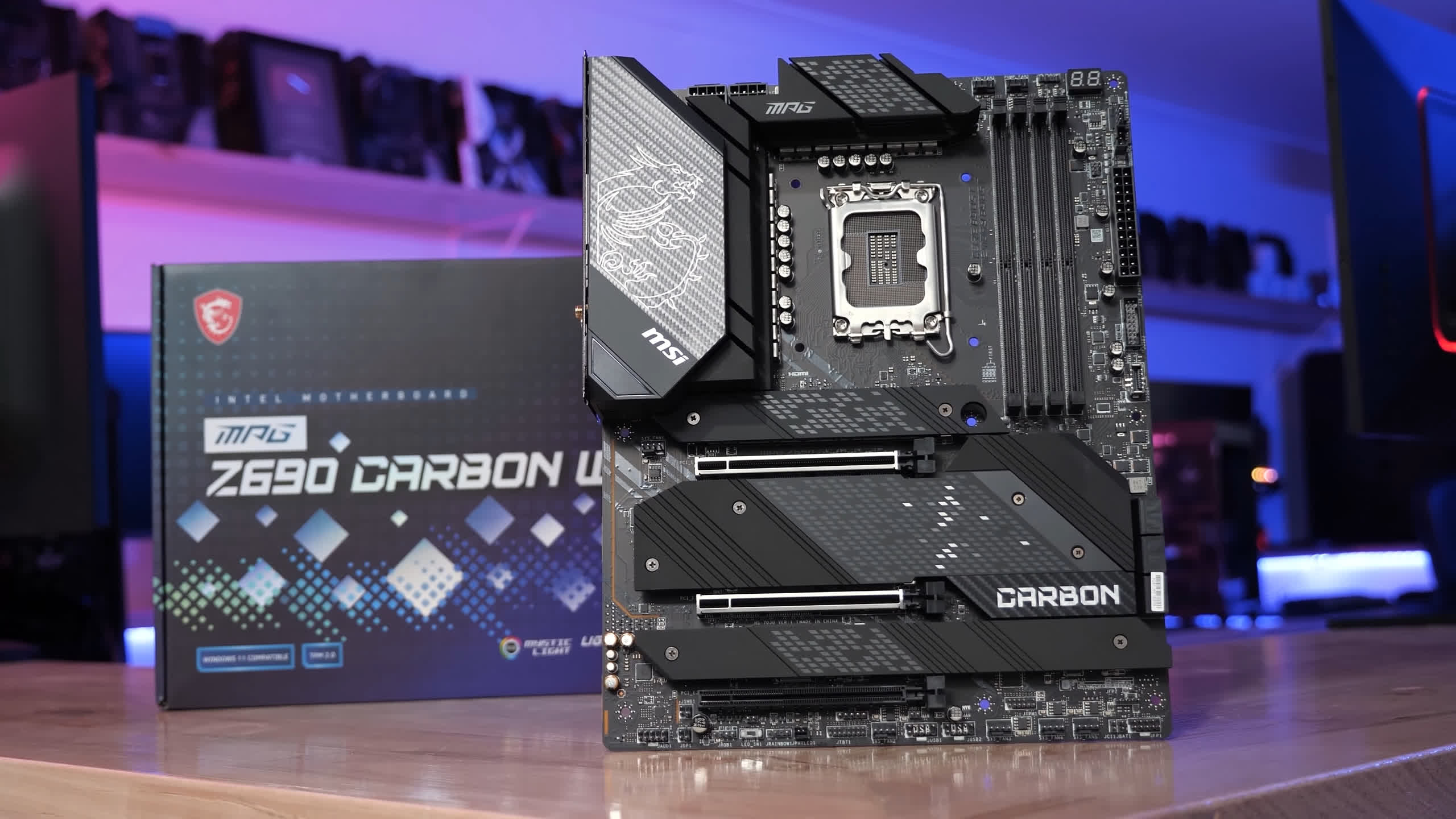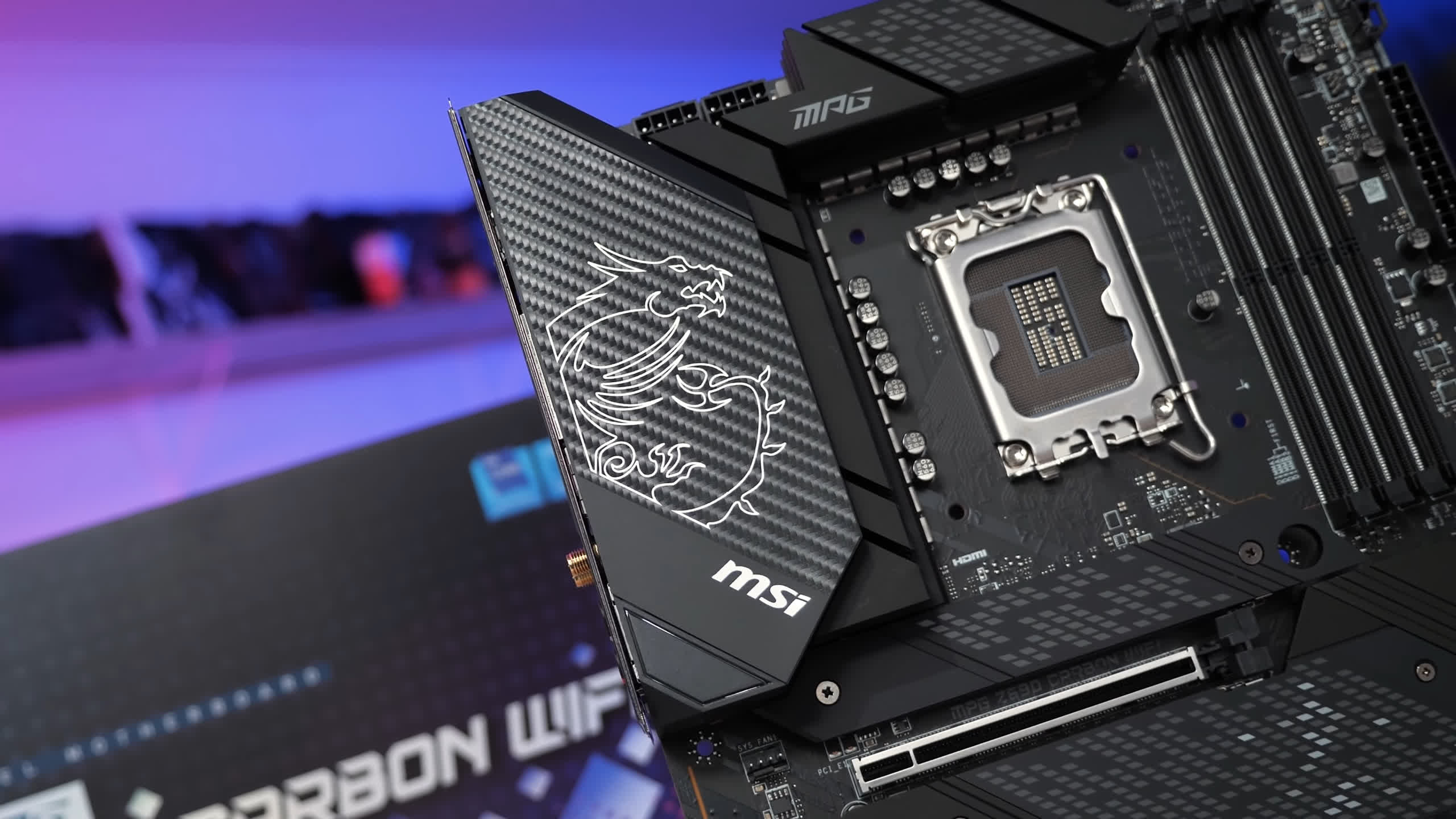The new Core i5-12600K is the only Alder Lake CPU that we've yet to review, having tested both the flagship 12900K a week before and then the nearly as fast (but more affordable) Core i7-12700KF. At $320, this latest generation Core i5 is a direct competitor to AMD's Ryzen 5 5600X, which is currently selling for $310, or slightly above its $300 MSRP.
The AMD chip packs 6 cores with 12 threads, while the 12600K includes 6 P-cores and 4 E-cores for a total of 16 threads. The P-cores can clock as high as 4.9 GHz, while the E-cores cap out at 3.6 GHz, so clock speeds are very similar to that of the 12700K, there's just 25% fewer P-cores, though the E-core count remains the same.
The L3 cache capacity has been reduced to 20 MB as well. Other than that, these new Core i5 and Core i7 processors are very similar. Given the 12600K is coming in almost 30% cheaper, it's set to be a cracking good deal.
Other specs also remain, so 20 PCIe lanes from the CPU, 16 of which are the new PCI Express 5.0 specification and support for both DDR4 and DDR5 memory, though not simultaneously and not by the same motherboard, so you'll have to pick in advance which memory type you wish to use.
| Intel Core i9 12900K | Intel Core i7 12700K | Intel Core i5 12600K | Intel Core i9 11900K | Intel Core i7 11700K | |
|---|---|---|---|---|---|
| MSRP $ | $650 | $450 | $320 | $540 | $400 |
| Release Date | November 2021 | March 2021 | |||
| Cores / Threads | 16 / 24 | 12 / 20 | 10 / 16 | 8 / 16 | |
| Base Frequency | 2.4 / 3.4 GHz | 2.7 / 3.6 GHz | 2.8 / 3.7 GHz | 3.5 GHz | 3.6 GHz |
| Max Turbo | 3.9 / 5.2 GHz | 3.8 / 5.0 GHz | 3.6 / 4.9 GHz | 5.3 GHz | 5.0 GHz |
| L3 Cache | 30 MB | 25 MB | 20 MB | 20 MB | 16 MB |
| Memory | DDR5-4800 / DDR4-3200 | DDR4-3200 | |||
| Socket | LGA 1700 | LGA 1200 | |||
Stock memory support includes DDR4-3200 or DDR5-4800, but we've been testing with even faster DDR5-6000 memory, which we evaluated the Core i9-12900K with. However we found that for the most part this high-speed memory offers very little extra performance when paired with an Alder Lake CPU. This lead us to conclude that most potential 12th-gen customers should ignore DDR5 and just go with DDR4.
Thus, for testing the 12600K we won't spend time running benchmarks with DDR5. If you want to see what's all that about, do check out the 12900K review where we compared both memory technologies.
As for the motherboards, we've gone with the MSI Z690 Tomahawk Wi-Fi DDR4 for testing. Due to the hybrid core design of Alder Lake, the 12600K and all other 12th-gen processors work best with Windows 11 and its improved thread scheduler for optimal performance. Therefore we've tested all CPUs, new and old, using a fresh install of Windows 11.
In a recent Windows 11 performance test we also found out that Ryzen gaming performance is typically a little faster using the more modern OS. The Ryzen test system used the Asus ROG Crosshair VIII Dark Hero motherboard with the latest BIOS update and all the latest Windows updates and drivers installed. Finally, all application and gaming data was collected using the Radeon RX 6900 XT graphics card.
Application Benchmarks
Starting with Cinebench R23, we find that the 12600K is in a completely different league to the 5600X delivering a whopping 63% more performance, to even beat out the 5800X. We're also looking at a 61% improvement over the 11600K, which is mighty impressive even when taking into account the 23% increase in price.


The single-core performance was also exceptional, beating the 5600X and 11600K by a 26% margin, a massive generational uplift. It also means the 12600K should comfortably beat the 5600X for both multi and single-core workloads.

Having said that, the 12600K and 5600X are evenly matched in the 7-zip file manager compression test, though this has been one of the weaker results we've seen for 12th-gen when looking at the 12700KF and 12900K, so it's no surprise.
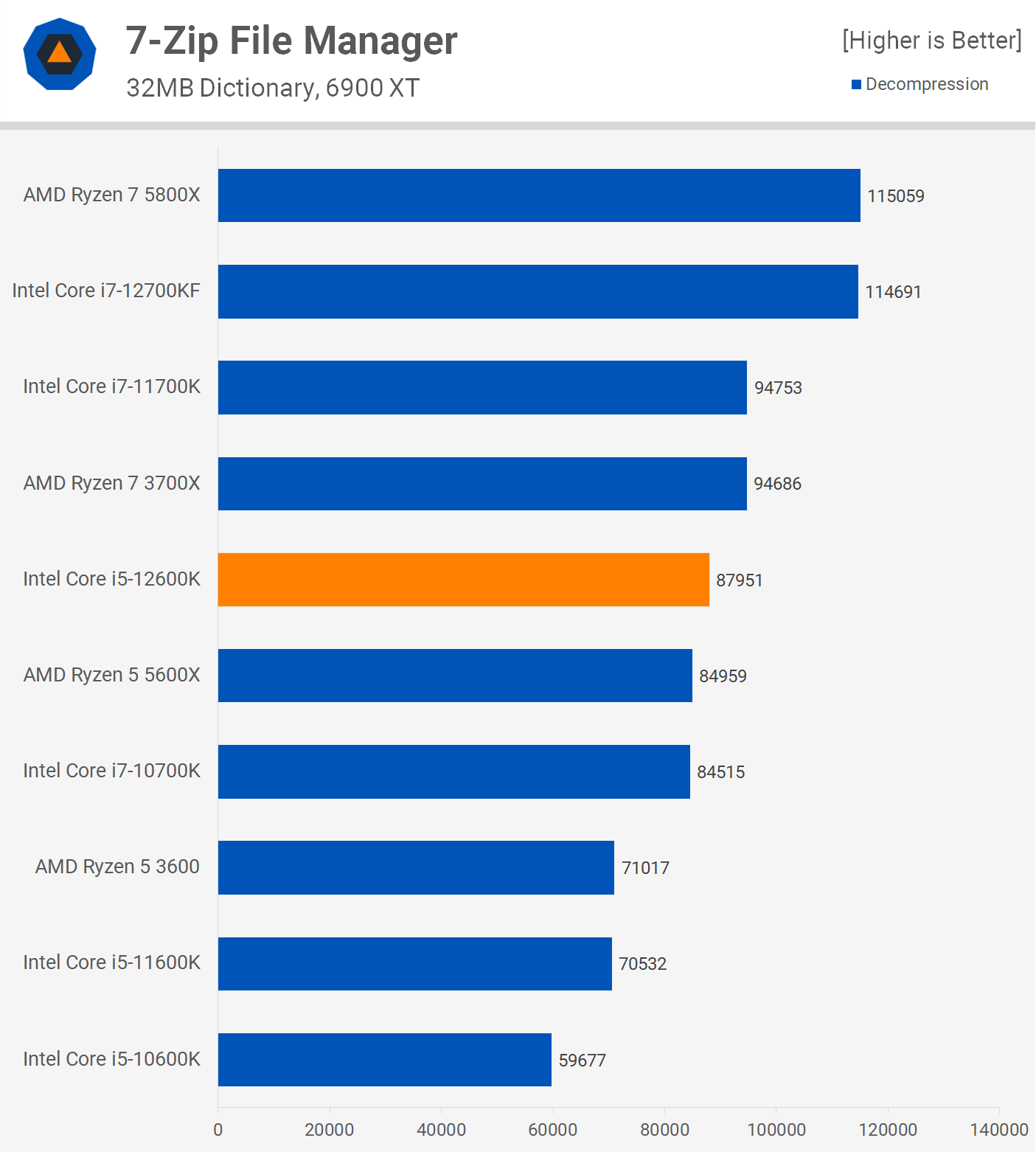
When it comes to decompression performance, the 12600K and 5600X are also tied, and that means the new Core i5 processor was 23% slower than the 12700KF.

The 12600K proves that it's in a completely different league, offering 48% greater performance than the Ryzen 5 5600X as it took just 86 seconds to complete the render, the exact amount of time it took the 5800X. As we said earlier, you're really getting next tier performance with the 12600K.

For content creators, the 12600K offers exceptional value by delivering almost 40% more performance than the 5600X and even outscored the 5800X by a 16% margin. We're also only talking about a 13% decline in performance when compared to the 12700K, which is exceptional value from Intel's latest Core i5 part.

Next up we have Adobe Photoshop and here the 12600K was 11% faster than the 5600X and able to match the 5800X. The Intel Core i5 part was also just 7% slower than the 12700KF, so the 12600K is shaping up to be the sweet spot in terms of price to performance for Intel 12th-gen lineup.

We see that the 12600K remains dominant over the 5600X in After Effects, providing 17% greater performance and that was enough to see it beat the 5800X by a 5% margin. We're looking at 12700K levels of performance making the 12600K one of the fastest desktop CPUs for this workload.
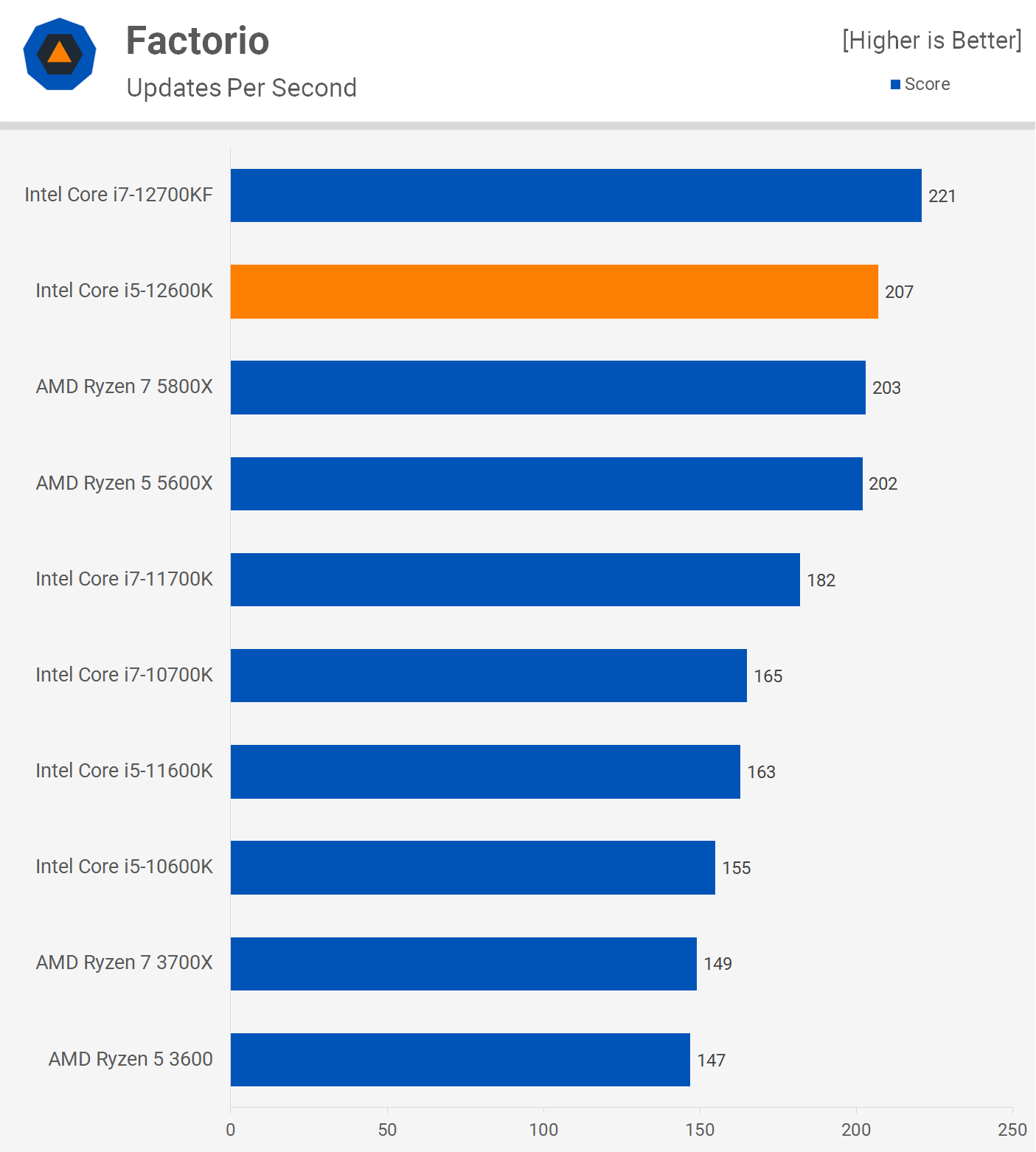
Factorio is a simulation game that we put alongside applications because we're not measuring frames per second, but rather updates per second. This automated benchmark calculates the time it takes to run 1000 updates. This is a single thread test which appears to heavily rely on cache capacity.
The new Core i5 performs exceptionally well here relative to the 5600X, the 5800X, and in particular to its predecessor, the 11600K, which is beat by a 27% margin. Moreover, it was just 6% slower than the 12700KF.

The 12600K is also a beast when it comes to code compilation performance, smashing the 5600X by a massive 57% margin, making it 19% slower than the more expensive 12700KF. We're also looking at a 43% generational improvement over the 11600K, so it kind of sucks if you bought one of those anytime in the last 9 months.
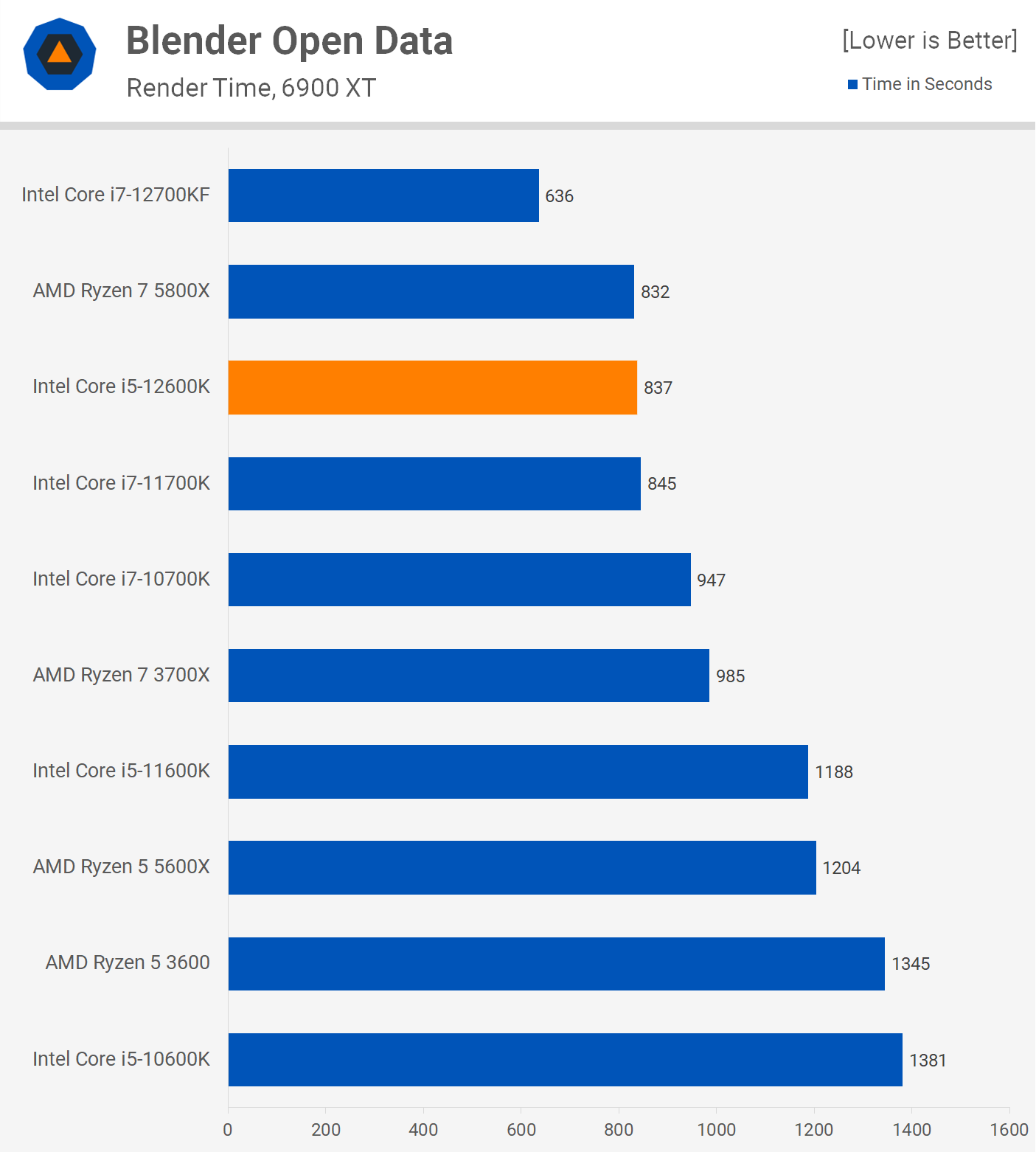
The last application benchmark that we're going to look at is Blender, and yet again the 12600K proves it's on a completely different level, smashing the 5600X by a massive 44% margin. Once again the new Core i5 processor is comparable to the 5800X and last generation's 11700K.

A massive problem for the top Alder Lake part, the Core i9-12900K, was power consumption though we found this was far less of a concern with the 12700K. Well, with the 12600K it's no concern at all as the 12600K pushed total system usage 46% higher than the 5600X, but it also delivered 44% more performance, so in terms of efficiency they're about the same.
The 12600K also matched the performance of the 5800X in this test, and we see total system usage to be roughly the same. So Alder Lake's power efficiency is better than we first thought.
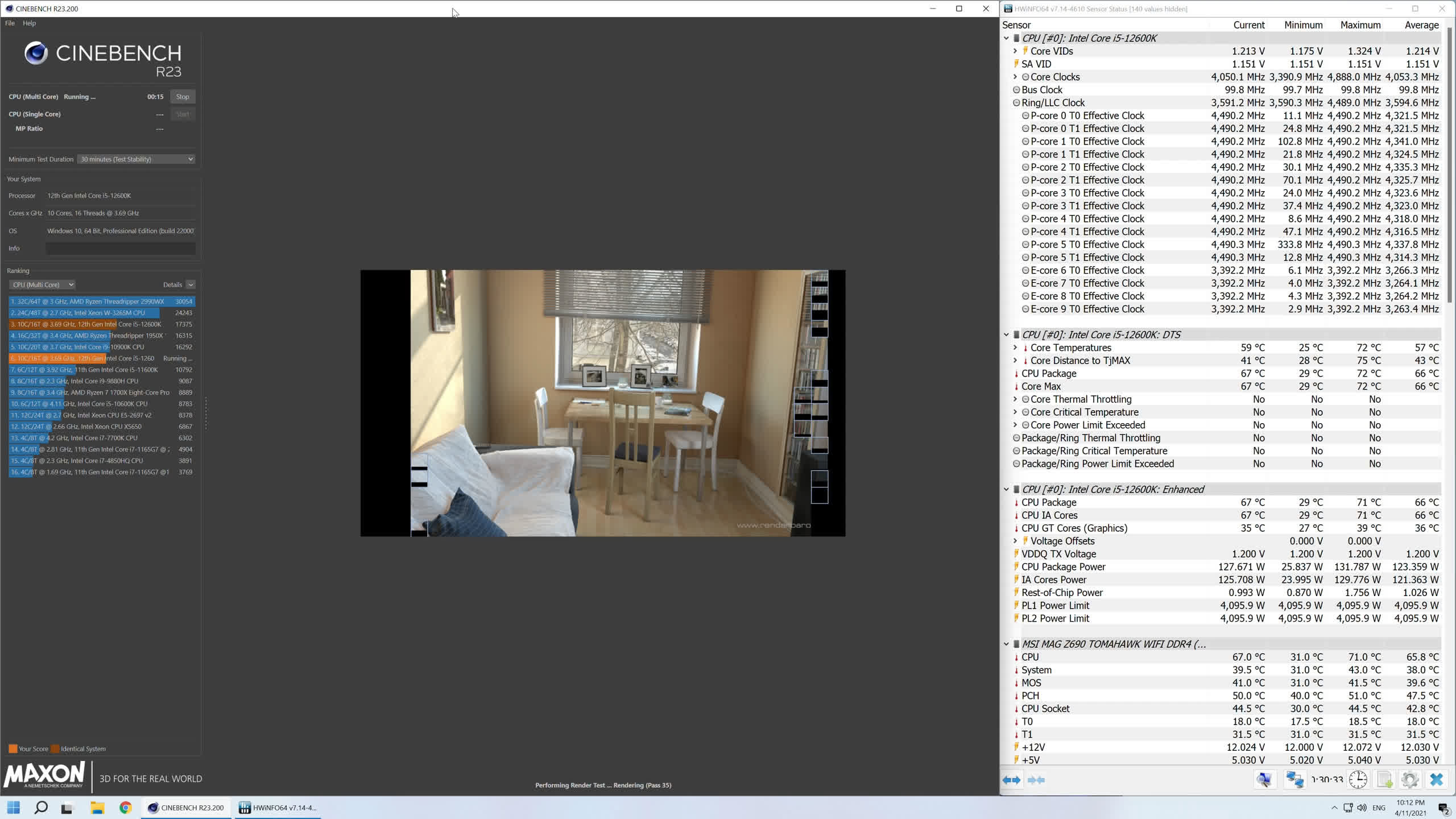
When it comes to cooling, we've used the Corsair iCUE H115i Elite Capellix for our temperature results, rather than the bigger 360mm MSI model used to cool the 12700K and 12900K. Using this more modest 240mm AIO, the 12600K peaked at 71C for the package and 72C for the cores, and these temperatures were reported in an enclosed Corsair Obsidian 500D case, in a 21C room, after 30 minutes of looking the Cinebench R23 multi-core test.
That's a reasonable temperature that makes the 12600K comparable to the 11600K or 5800X. It also means with the 240mm AIO we do have some thermal headroom for overclocking and this is something we'll explore in the future.
Gaming Performance

Time for the all-important gaming benchmarks and we'll start with F1 2021. For all gaming tests we're using the Radeon RX 6900 XT with dialed down quality settings at 1080p. The 12600K enabled 373 fps on average with a 1% low of 260 fps in this racing sim. When compared to the 5600X, we find the 12600K to be a mixed bag offering a 5% stronger 1% low, with 5% slower average frame rate performance. Overall though performance is much the same between these two processors, along with the 5800X and 12700KF.

Moving on to Rainbow Six Siege, the 12600K is less impressive despite pushing up near 400 fps at all times with an average frame rate of 511 fps. The 5600X is 10% faster, though how much that even matters is hard to say given all CPUs tested here were capable of pushing extreme frame rates.
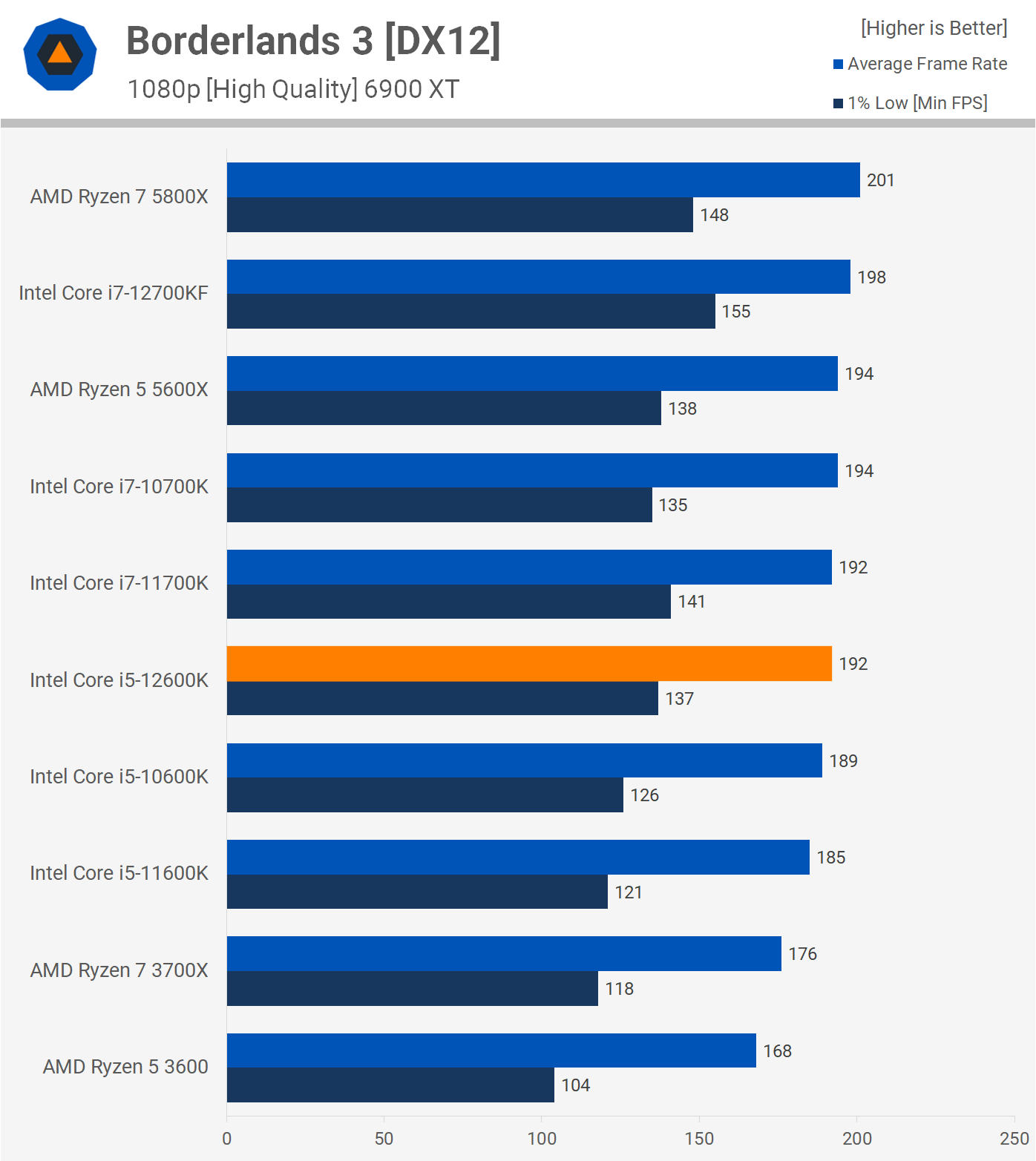
The 5600X and 12600K delivered basically identical performance in Borderlands 3 with no more than 2 fps separating them. Both were close to extracting the most amount of fps possible from the 6900 XT under these test conditions, so needless to say performance was excellent.
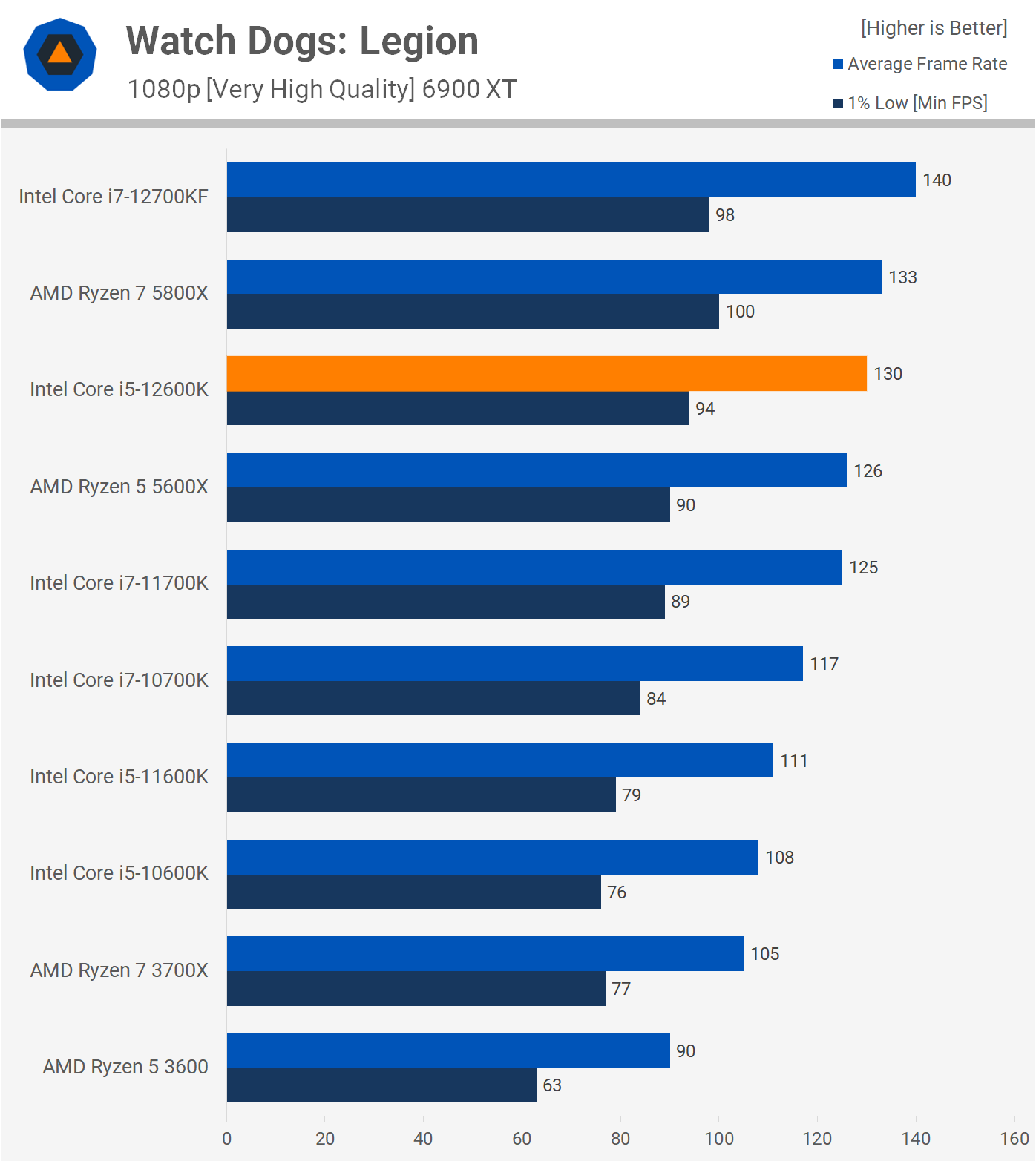
Moving on to Watch Dogs: Legion, we again find that the 5600X and 12600K are evenly matched when gaming, this time the Intel processor was faster by a small 3% margin.
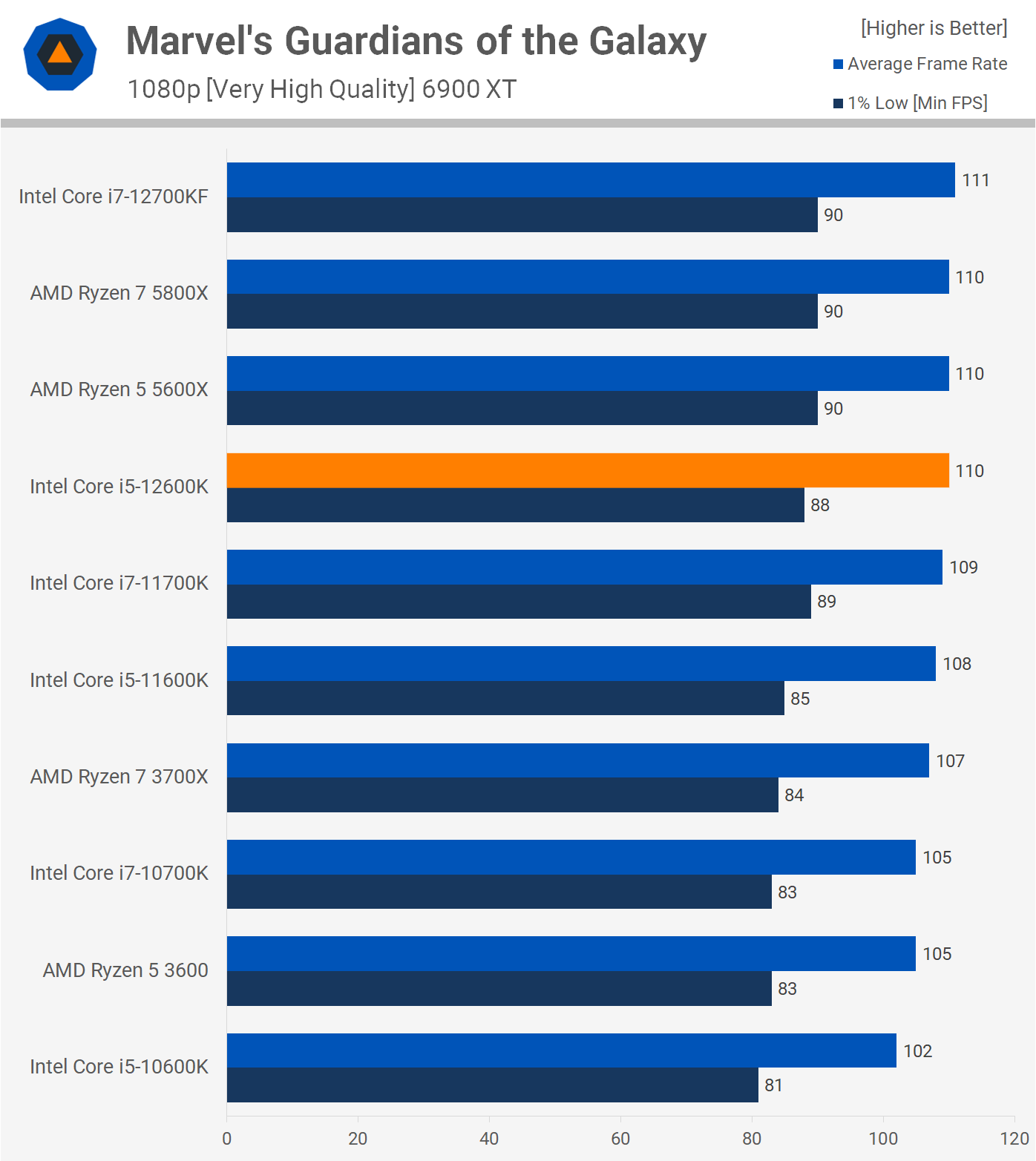
Marvel's Guardians of the Galaxy is heavily GPU limited with these higher-end CPUs, despite the fact that we're testing at 1080p with an extremely fast graphics card. But we feel results like these are important to include, because despite the unrealistic test conditions that aim to highlight CPU performance, we find that the game is still very much GPU limited, and this is important to note as the vast majority of games out there will be GPU limited when using a relatively powerful CPU. Anyway, given that the 5600X and 12600K are able to max out the GPU, performance is basically identical using either CPU.
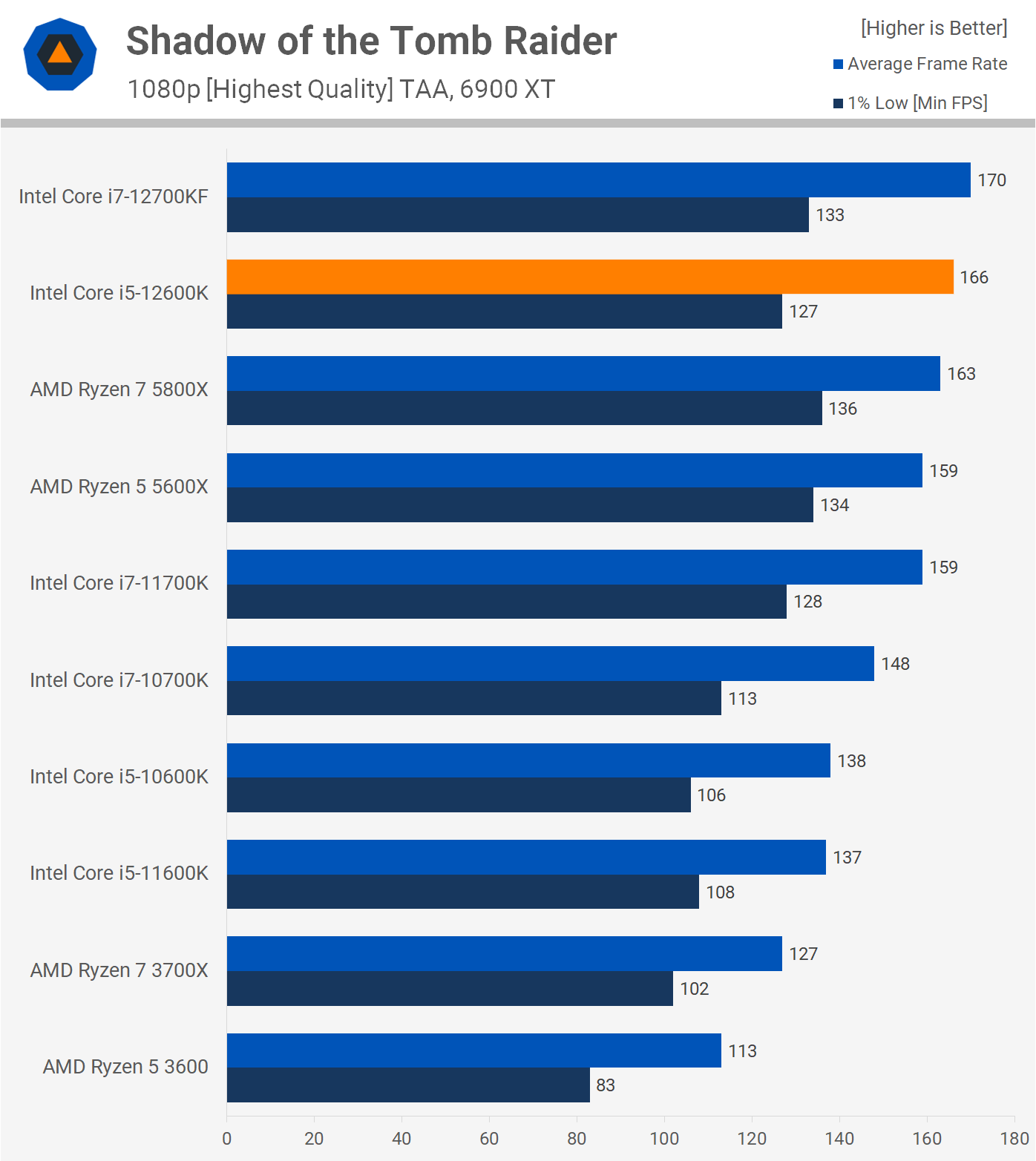
The Shadow of the Tomb Raider results are far more interesting as this is a very CPU intensive title and like what we found with F1 2021, the results are a mixed bag. The 12600K was 4% faster than the 5600X when measuring the average frame rate, but 5% slower for the 1% low. Still, performance was much the same and you're certainly not going to notice any difference between these two CPUs.
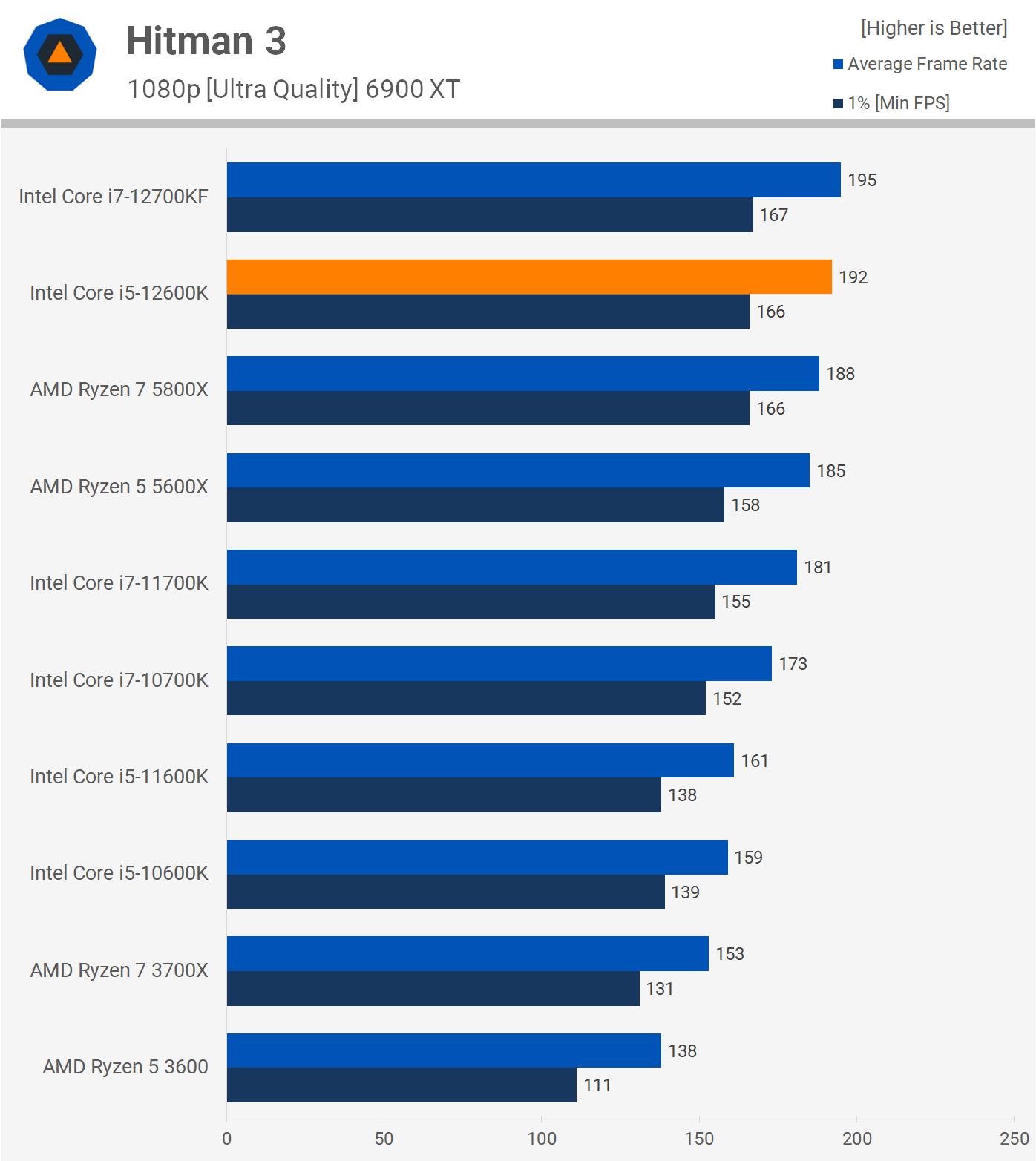
Hitman 3 is also very CPU demanding, but again, if you have a 6-core/12-thread processor from the past few generations you've got more than enough processing power to avoid any frame stuttering with well over 100 fps for the 1% low. That being the case, the 12600K crashed it with 166 fps for the 1% low and 192 fps on average making it 4% faster than the 5600X.
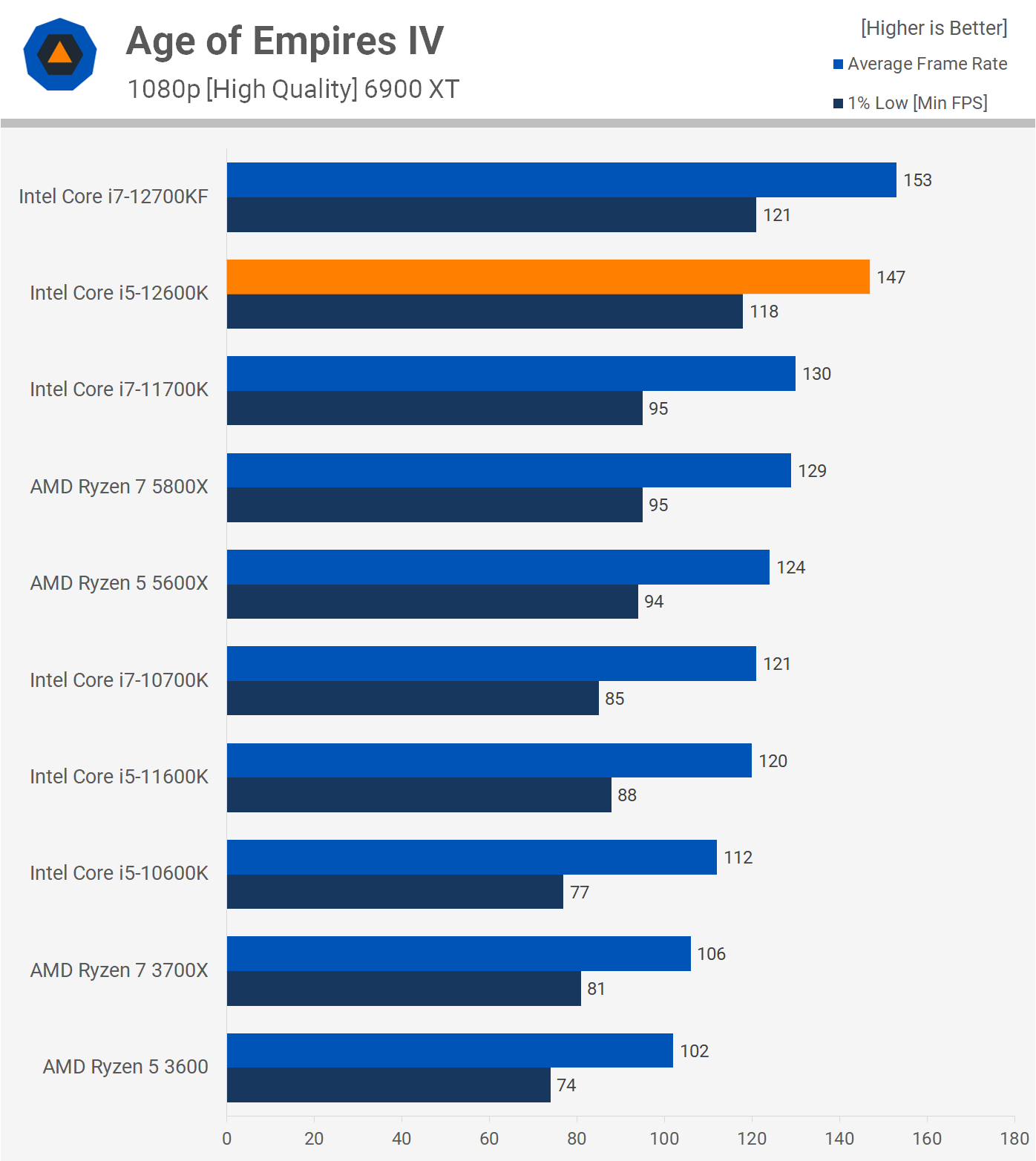
Where the Core i5-12600K really excels is on Age of Empires 4 where it's almost 20% faster than the 5600X, and that's a major performance advantage. It also meant that the new Core i5 part was a good bit faster than the 5800X and 11700K.
Previously we made the mistake of suggesting this title could be hinting at future performance margins between Zen 3 and Alder Lake, but regrettably I was completely wrong about that. After closer inspection we've discovered that Age of Empires 4 is a single threaded game, so these results are more indicative of performance for older games, like StarCraft 2, for example.
Basically what we're looking at here is the strong single core performance of Alder Lake. The 12600K was 26% faster than the 5600X when measuring single core performance in Cinebench R23, and we're seeing that translate to an almost 20% win here.
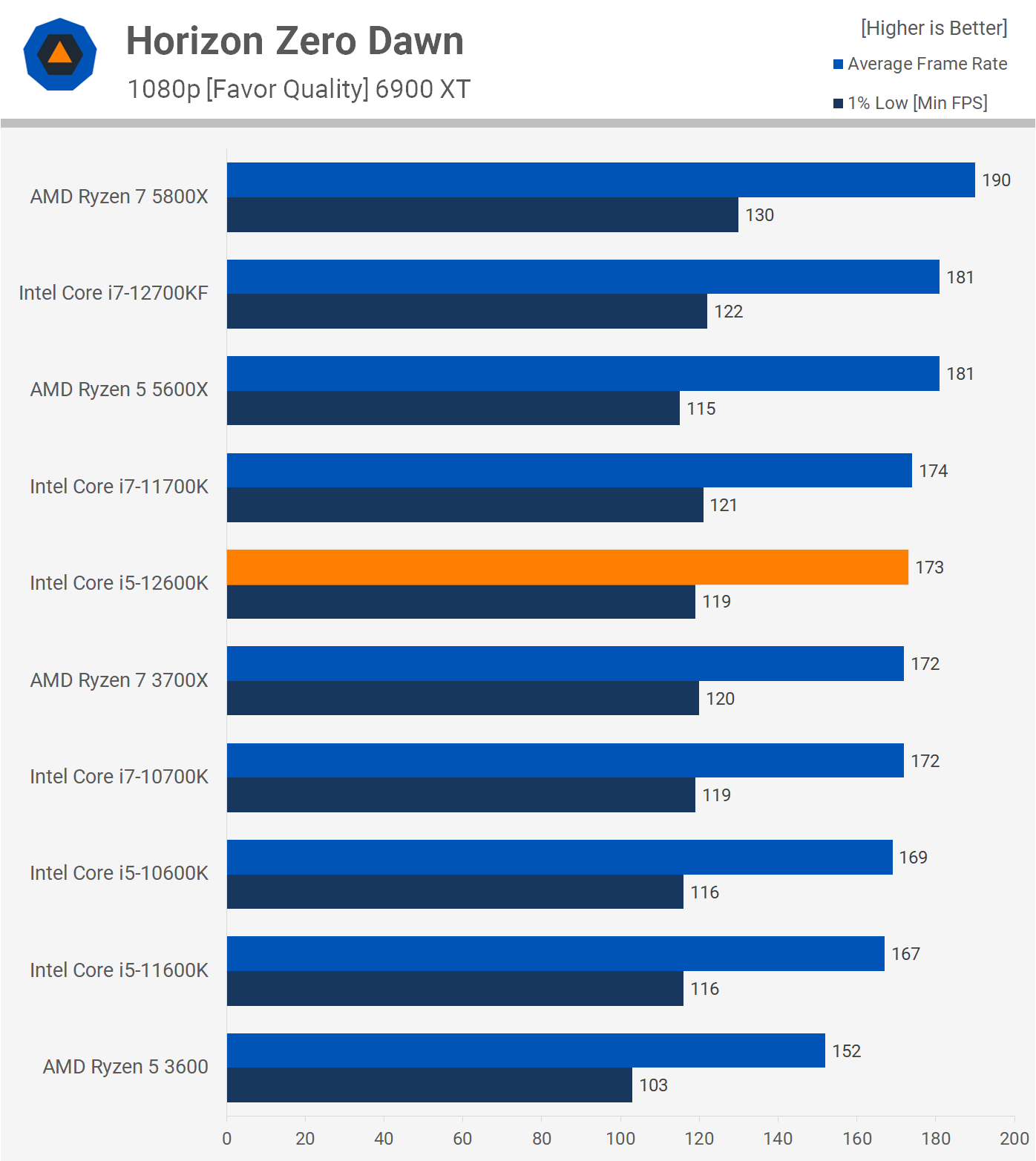
At least for now though, most games look like what we see here in Horizon Zero Dawn and that is to say, the gaming performance difference between the 12600K and 5600X is non-existent. The 5600X was 5% faster when comparing the average frame rate, but 3% slower for the 1% low, so again performance here is indistinguishable.
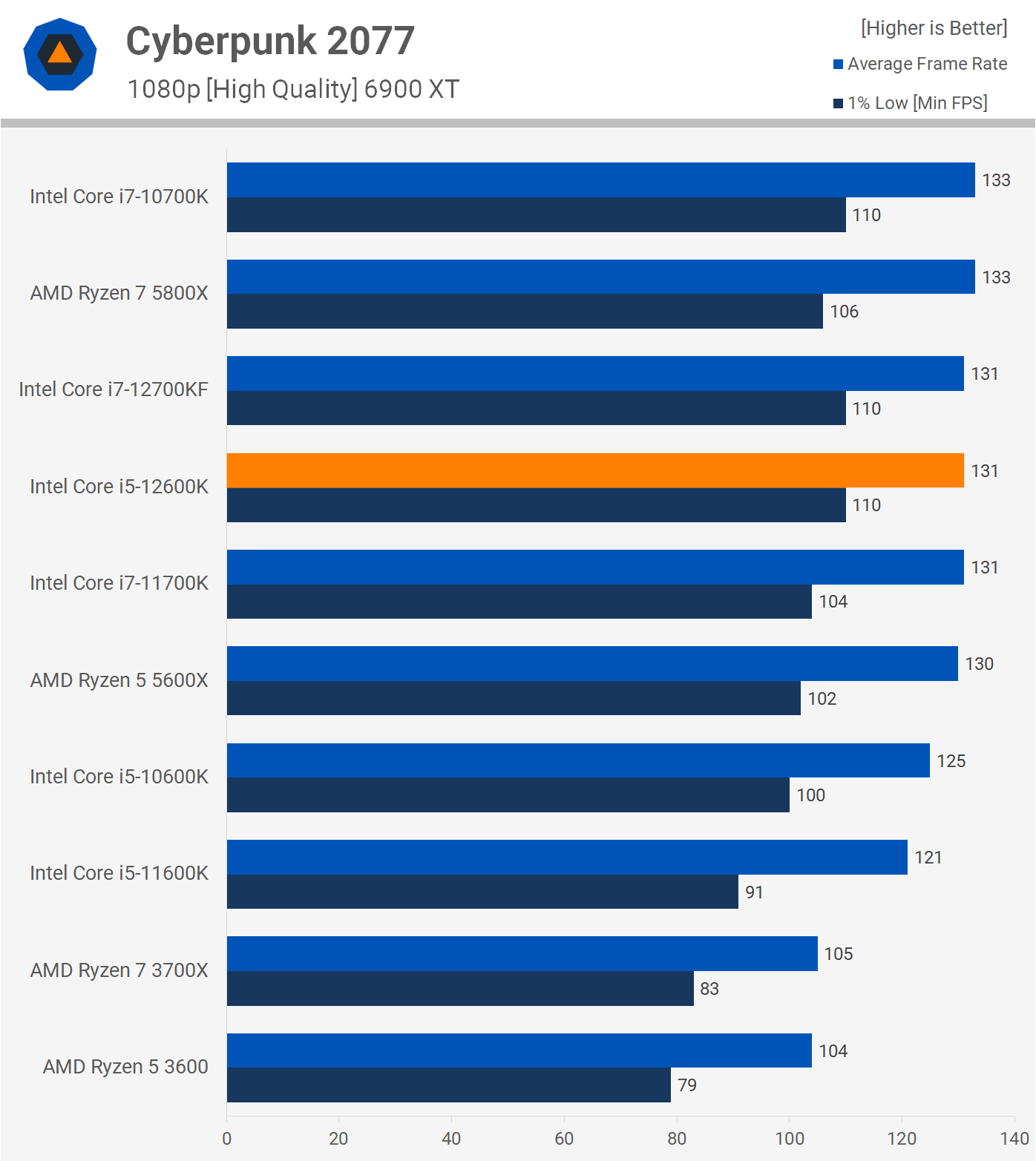
Cyberpunk 2077 is yet another game where the results are mostly GPU limited using the latest generation CPUs from AMD and Intel. In fact, with Intel you can go back a few generations for 6-core/12-thread processors or better. That means the 12600K and 5600X are comparable in terms of performance, though the Core i5 did offer 8% greater 1% low performance.

When it comes to power consumption for gaming, there's very little difference between the 12600K and 5600X as the Core i5 processor pushed total system usage just 4% higher, which is a negligible difference.
10 Game Average
Here's the 10 game average and overall the 12600K and 5600X are evenly matched with the Intel CPU up to just 3% faster. So at least when it comes to gaming it doesn't matter which processor you use and both represent the best value for gamers from their respective lineups.
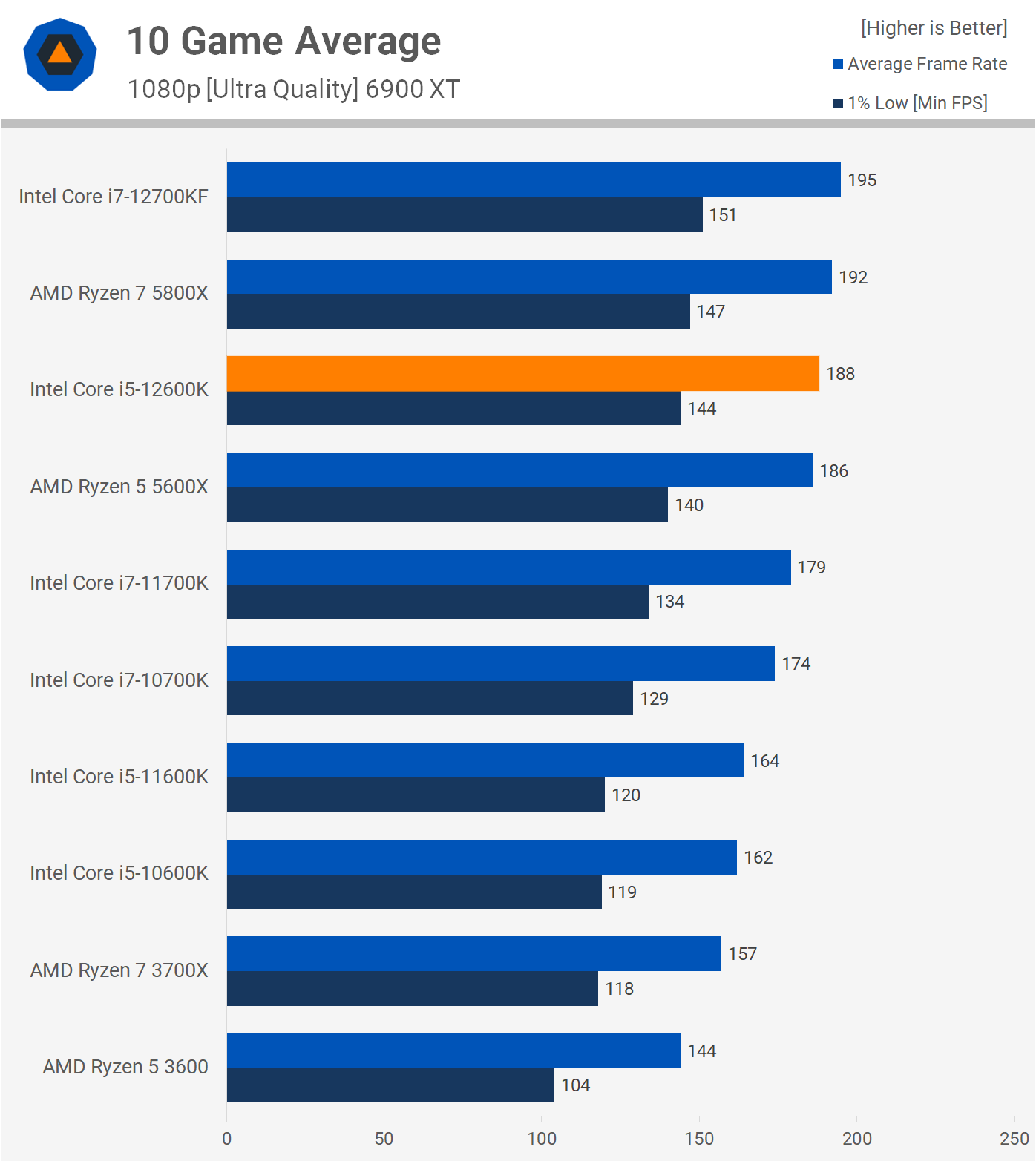
A Ryzen 5 Killer?
That's how the Core i5-12600K performs and damn, Alder Lake keeps getting better the further down the product stack we go. The Core i9-12900K was decent, it traded blows with the Ryzen 9 5900X and 5950X, but wasn't a clear option over either. The Core i7-12700K is a great alternative to the 5800X and is my preferred choice given the often significantly stronger application performance with typically better results for gaming.
The Core i5-12600K continues that trend, but does even better relative to its nearest competitor, the 5600X. Worst case, the 12600K was only slightly faster than the 5600X in single and multi-core workloads, but it was often much faster and the performance improvement offset the extra power usage, so power consumption isn't an issue for the 12600K. Any cooler capable of keeping the 11600K or 5800X in check will work just fine on the 12600K.
When it comes to gaming, the 12600K and 5600X are a match, especially in modern games that utilize many cores. Where the 12600K has an advantage is for older games, or games like Age of Empires 4 that tax a single core – here the superior single core performance of Alder Lake is put on full display, boosting frame rates by around 20%.
Looking at just the CPUs, the Core i5-12600K for $320 or the Ryzen 5 5600X for $310, we've got to say there's no way we'd go with AMD if we were building a brand new system, or upgrading my platform. Obviously, if you have a Zen+ or Zen 2 CPU and you're looking to boost performance, the 5600X is a decent drop-in replacement option, short of the 5800X or 5900X, for example. But for those starting over, we'd personally ignore Zen 3 at current prices.
The only hiccup for the 12600K right now may be motherboard pricing. That could swing the value equation in AMD's favor, at least until cheaper 600 series chipsets arrive. Right now, the cheapest Z690 board we'd consider is the Gigabyte Z690 UD DDR4 at $200, and short of any real testing, it's still a bit of an unknown quantity.
For the 5600X, which of course has been in the market for an entire year, there are a number of cheaper motherboard options, such as the X570 TUF Gaming Wi-Fi which can be had for $190 or more affordable B550 options. Assuming you're happy to drop PCIe 4.0 support for 3.0 from the chipset, there's a good number of quality B550 boards priced between $110 and $150, such as the MSI B550-A Pro, MSI B550M Bazooka, Asus TUF Gaming B550M-Plus, MSI B550 Gaming Plus, MSI B550M Mortar and MSI B550 Tomahawk. That's a whole bunch of MSI boards, not sure what is going on with pricing and availability from Asus and Gigabyte, but we know from first hand testing that those MSI boards are very good.
The MSI B550M Bazooka for $130 is probably one of the better quality options there, but we also like the MSI B550 Tomahawk for $150 a lot and we think it's worth the extra $20. It's also a better matchup for the Gigabyte Z690 UD DDR4. In that example, AMD is $50 cheaper on the motherboard side, and that means overall the 5600X + B550 package is $60 cheaper.
This could be seen as tipping things in AMD's favor when it comes to value... sort of. Prior to the release of Alder Lake I wasn't even recommending the 5600X because it's not great value at $300. In our opinion, it needs to be closer to $250 or less now that Intel has much stronger competition and there are hints of price reductions already.
The reason is that if you want the ultimate value, then grabbing the Core i5-10400F for just $180 is the way to go. Throw it on the $100 MSI B560M Bazooka and you've got a great gaming combo for less than the price of the 5600X. So if you're on a tight budget, that's as good as it gets at the moment, but if you've got another $200 to spend on the combo, we'd go with the 12600K on an entry-level Z690 board, or hold out for the cheaper B and H-series chipsets.
Intel has put AMD in a tight position with the Alder Lake launch, so it'll be interesting to see how the Red Team reacts. For now though, the Core i5-12600K is our go-to CPU in the $300 price bracket.
